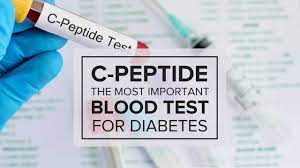C-PEPTIDE
C-peptide testing can be used for a few different purposes. C-peptide is a substance produced by the beta cells in the pancreas when proinsulin splits apart and forms one molecule of C-peptide and one molecule of insulin. Insulin is the hormone that is vital for the body to use its main energy source, glucose. Since C-peptide and insulin are produced at the same rate, C-peptide is a useful marker of insulin production.The following are some purposes of C-peptide testing:A C-peptide test is not ordered to help diagnose diabetes, but when a person has been newly diagnosed with diabetes, it may be ordered by itself or along with an insulin level to help determine how much insulin a person's pancreas is still producing (endogenous insulin).In type 2 diabetes, the body is resistant to the effects of insulin (insulin resistance) and it compensates by producing and releasing more insulin, which can also lead to beta cell damage. Type 2 diabetics usually are treated with oral drugs to stimulate their body to make more insulin and/or to cause their cells to be more sensitive to the insulin that is already being made. Eventually, because of the beta cell damage, type 2 diabetics may make very little insulin and require injections. Any insulin that the body does make will be reflected in the C-peptide level; therefore, the C-peptide test can be used to monitor beta cell activity and capability over time and to help a health practitioner determine when to begin insulin treatment.People who are on insulin therapy, regardless of the source of the insulin, may develop antibodies to insulin. These typically
interfere with tests for insulin, making it nearly impossible to directly evaluate endogenous insulin production. In these cases, Cpeptide easurement is a useful alternative to testing for insulin.C-peptide measurements can also be used in conjunction with insulin and glucose levels to help diagnose the cause of documented hypoglycemia and to monitor its treatment. Symptoms of hypoglycemia may be caused by excessive supplementation of insulin, alcohol consumption, inherited liver enzyme deficiencies, liver or kidney disease, or by insulinomas. The C-peptide test may be used to help diagnose Insulinomas. These are tumors of the islet cells in the pancreas that can produce uncontrolled amounts of insulin and C-peptide and can cause acute episodes of hypoglycemia. C-peptide tests may be used to monitor the effectiveness of insulinoma treatment and to detect recurrence.Sometimes a C-peptide test may be used to help evaluate a person diagnosed with metabolic syndrome, a set of risk factors that includes abdominal obesity, increased blood glucose and/or insulin resistance, unhealthy blood lipid levels, and high blood pressure (hypertension).Rarely, when someone has had his pancreas removed or has had pancreas islet cell transplants, intended to restore the ability to make insulin, C-peptide levels may be used to verify the effectiveness of treatment and continued success of the procedure.
^Clinical Use
* Assess pancreatic islet cell function
* Distinguish Insulin secreting tumors (Insulinoma) from exogenous insulin administration as a cause of hypoglycemia (commercial insulin does not contain C-peptide)
* Distinguish Type I & Type II Diabetes mellitus
^Increased Levels- Insulinoma & Type II Diabetes
^Decreased Levels – Type I Diabetes & Exogenous insulin administration.



